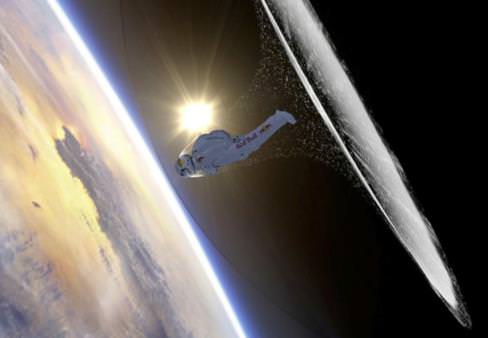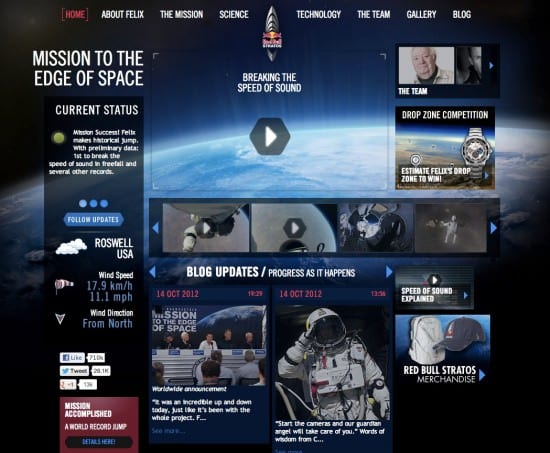Red Bull: A lesson in modern marketing?
 I was debating writing this post, after all there's so much written about the Red Bull Stratos mission in the 2 days since it was finally completed. Yet I've not seen much written about how the event supports branding and marketing. I think there are certainly learnings for marketers like us, most of us who aren't multi-million pound brands.
I was debating writing this post, after all there's so much written about the Red Bull Stratos mission in the 2 days since it was finally completed. Yet I've not seen much written about how the event supports branding and marketing. I think there are certainly learnings for marketers like us, most of us who aren't multi-million pound brands.
So, what are the practical marketing ideas that we can really take from all of this? Here are our 4 lessons from the Stratos mission...
- Success comes from committing to the hard work. Red Bull included, was this easy for them - no way. The Stratos project took 7 YEARS to plan and execute with ex-NASA engineers which means that Red Bull started doing the work seriously as early as 2005. We may think that Red Bull have all the resource, that they can 'afford it, it's easy for them'. But 2 years is something that very few brands will commit to, let alone 7 - it tells us everything that we need to know. That is serious commitment to plan and see through, imagine the cost and energy expended by the team over 7 years. Red Bull have to be equally connected and committed internally, from the CEO down, it's clearly not a marketing side project, or a late tactical campaign to drive extra sales units. I certainly doubt that Red Bull worry about PPC, sponsored tweets, Facebook advertising or 'SEO'. They worry about what inspires their customer, and commit to it. The rest looks after itself.

- Big, consistent ideas that move their tribe. Red Bull gives you wings - we all know it from years of above the line advertising, the difference is Red Bull live their positioning. Even as far as 'winged' ideas go, it's not everyday that somebody breaks the sound barrier in a spacesuit whilst 24 miles above the earth, and not many brand's enable you be so close to seeing it. Let's face it, this idea's out there. And yet this is a long line of pretty ground breaking executions thats included stunt plane, skate, motor cross, ski, snow-boarding, rapids or F1 concepts, sponsorship deals and events are all orientated around what their consumer wants. They did all that whilst working on Stratos. By making it about their tribe, you can't help but 'feel' something for Red Bull. I don't even drink Red Bull yet I've come to love the brand as it's begun spin out into creating amazing content I want to watch and talk about, The Art of Flight movie is a must buy for anyone into snow sports and art. It speaks to me.
- Brands are publishers as well as marketers. Red Bull have their own media division, Red Bull Media House, and they know how to promote it, how's that for joined up marketing? Is the Stratos stunt with £100m in equivalent ad spend - who knows, logically the 8 million people worldwide who watched YouTube's live stream on Sunday is pretty expensive to buy, and they were just the ones who cared enough to watch live - the "influencers" we might say. What about the additional 40 TV stations and 130 digital outlets (in the US alone, according to ABC News). Red Bull's Facebook photo post of a jumping Baumgartner gained almost 216,000 likes, 10,000 comments and over 29,000 shares in just 40 minutes, that's notwithstanding half the worldwide trending topics on Twitter were related to Red Bull Stratos. No matter how you cut it, that's one serious return on investment in just 2 days. But what about the other measurable and immeasurable benefits, the way that people feel about the brand, the volume of people who decide to try or re-try the product, or even decide to just look at their Facebook page and learn more about what else Red Bull does, the countless people who discussed the campaign from postponed launch (PR stun to drive more conversation and attention, maybe!) to the eventual event. Content on the quality scale of Red Bull has the ability to win hearts as well as minds, it creates conversation and connects people to each other. Where are Coca-Cola in all this? Still advertising, sponsoring some safe stuff, maybe.

- Hub and spoke. Aside from the Red Bull Stratos website, and Redbull.com, Red Bull have a dedicated 'Content Pool', yep. It's largely a blog to you and I, one shaped to house all of their stories in one place. A place where they can control the perspective that you enter into their world, complete with media room for the, err, less proactive journalists who they want to guide and shape. One trip to their hub site and you're immediately educated that Stratos is no one-trick event, Red Bull are into all kinds. The Content Pool also enables data capture as well as purchase of content. You get exactly the same story, albeit in a different guise, on their, YouTube, Twitter account and Facebook page. Red Bull make it easy to see the breadth of their offering aside from Stratos, including Psy of 'Gangnam Style' teaching their F1 team to dance, through to dirt bikes and a Red Bull energy cell for your iPhone. With great content, Red Bull's marketers know their out-posts, and how to use them.
Are Red Bull changing marketing? In their own way, there's no shadow of a doubt. And yet my sense is that this is not anything like the marketing or sponsorship genius that I'm hearing, it's much simpler than that. Since day one Red Bull has lived it's own brand, born in Austria with guys throwing themselves down the slopes on boards and ski's, the brand has remained true to its roots. Red Bull is a consistently growing story that's based on knowing their tribe's passions. They're so close to their consumer that they have the big exciting ideas as easily as anyone else, they then confidently commit to doing the hard work of executing on it. Red Bull personify content marketing because they create stuff worth liking, sharing and commenting on. It's that simple, and that difficult.



 I was debating writing this post, after all there's so much written about the Red Bull Stratos mission in the 2 days since it was finally completed. Yet I've not seen much written about how the event supports branding and marketing. I think there are certainly learnings for marketers like us, most of us who aren't multi-million pound brands.
I was debating writing this post, after all there's so much written about the Red Bull Stratos mission in the 2 days since it was finally completed. Yet I've not seen much written about how the event supports branding and marketing. I think there are certainly learnings for marketers like us, most of us who aren't multi-million pound brands.




